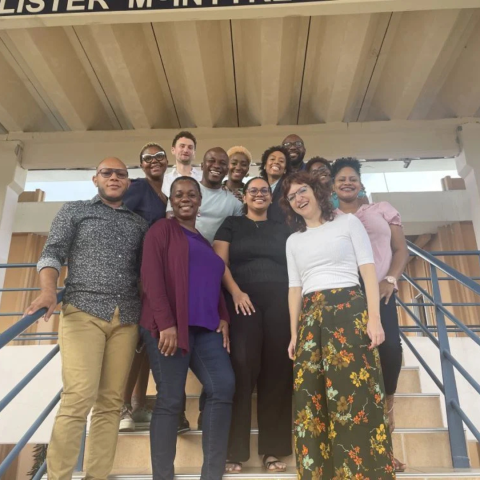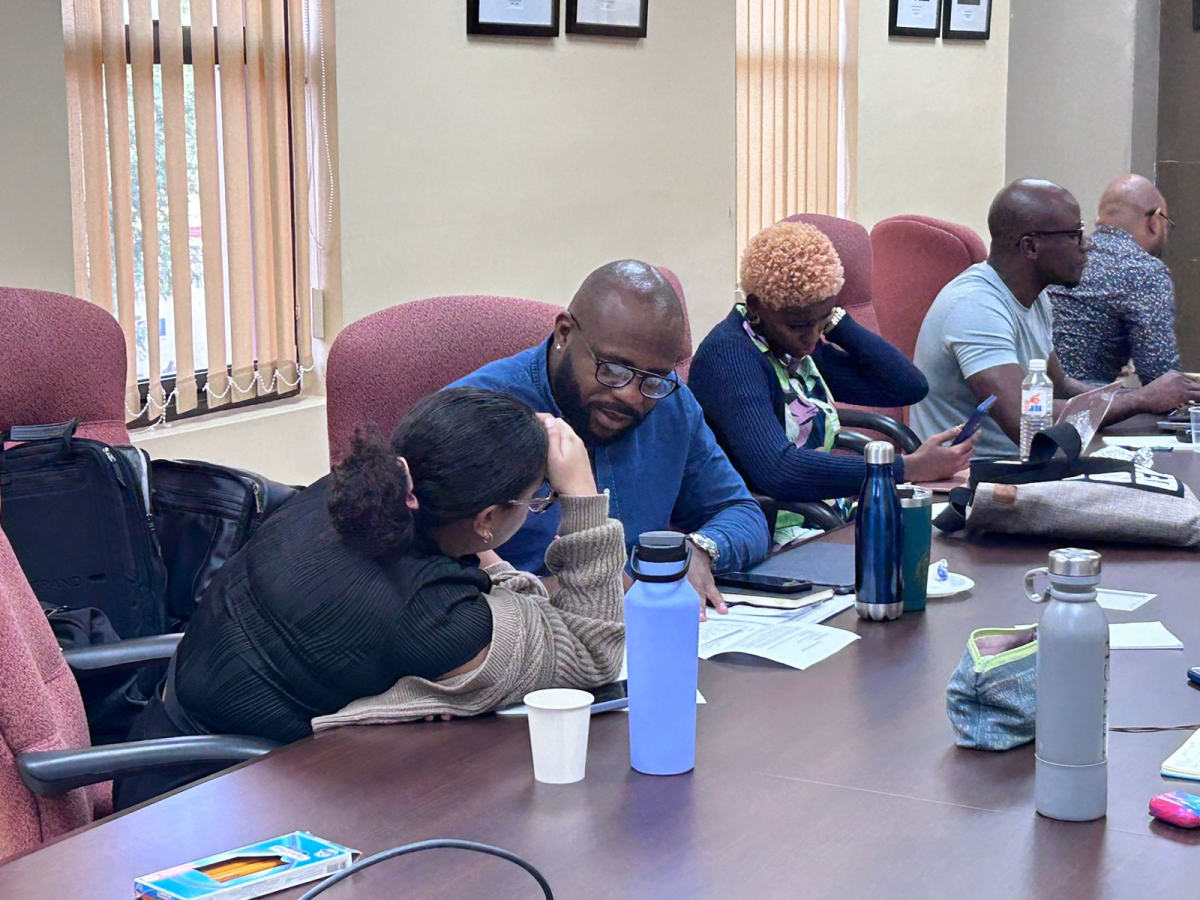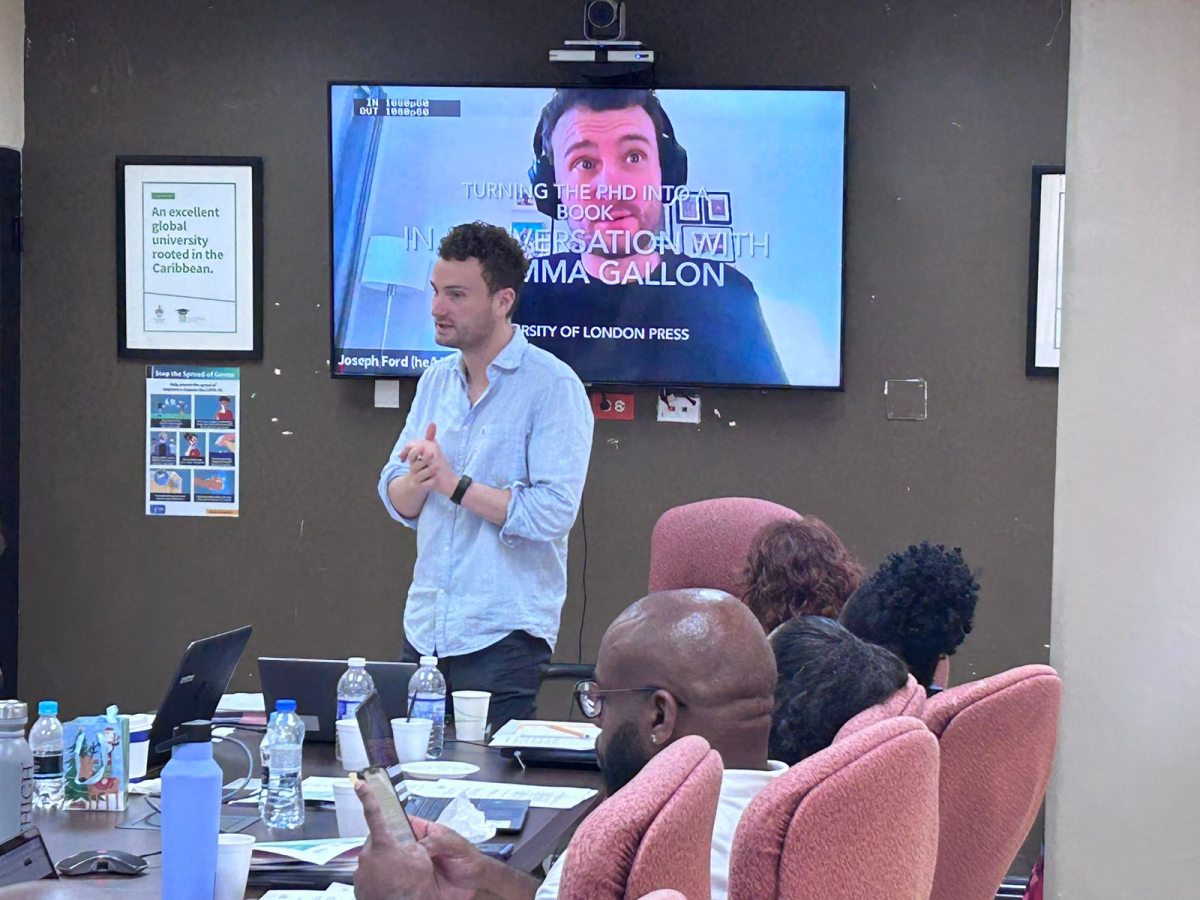

On the 10th to 12th January 2024, 10 Caribbean scholars convened at the University of the West Indies, Mona Campus after a highly competitive selection process to be part of a workshop under the project Building a Transnational Community of Practice: Writing and Research Development in Latin America and the Caribbean. The participants were from a diverse background, representing a spectrum of disciplines and research interests including social policy, cultural studies, sustainable development and the green economy, business, education, film and music, heritage, LGBT, and international relations. This diversified forum enriched the collaborative efforts among the team, deepened participants’ understanding of various disciplines and fostered a regional community of practice. The project, which was funded by The British Academy’s International Writing Workshop 2022 Programme and facilitated through the Centre for Latin America and Caribbean Studies (CLACS), University of London in collaboration with The University of the West Indies, Mona, aimed to foster relations among Latin American and Caribbean researchers who were in their early to mid-careers and develop their writing skills.
Workshop Insights
There were several insights to be gained from the interactive workshop. The team learned valuable ideas, tips and skill sets about publishing in scholarly international journals and each attendee had the benefit of having a writing mentor, which was one of the major strengths of the project. Participants submitted draft papers to mentors who provided individualised critical feedback for their improvement. The feedback situated scholars’ original work within international arenas, while maintaining the cultural relevance of the Caribbean context.

Another invaluable experience gained from the workshop was the presenters’ encouragement to broaden the concept of impact. Within academic spheres the recent trend of targeting only high-impact factor journals was addressed. This trend can be intimidating for early scholars, and while not impossible, is quite daunting. Participants were therefore encouraged to broaden the concept of impact, and to incorporate international journals which are open access, mid-tier and respected within the discipline’s field of interest. This broadened perspective is also a critical tool in reducing the fear often associated with successfully completing a manuscript for publication.

Special attention was also given to research methodologies, particularly the growing movement of decolonizing research methods. This approach challenged the Eurocentric foundations of traditional research by centering Indigenous knowledge systems, lived experiences and culturally relevant frameworks. This is a crucial shift for Caribbean researchers, given the region’s colonial history and its lasting impact on knowledge production. What made the discussion particularly enriching was the presence of two experts in the field, one facilitator and one participant both of whom recently completed and published book chapters on decolonizing research methods in the Caribbean. Their insights provided a deeper understanding of how research can be conducted in ways that empower local communities, validate non-Western epistemologies, and resist the imposition of colonial narratives. All of this enriching discussion occurred within a space that allowed participants to be vulnerable, where both presenters and participants freely shared their experiences. The real triumphs and challenges in pursuing academic publications and the academic pressure of ‘publish or perish’, brought to the fore the commonalities among team members, reinforcing the importance of fostering this community of practice among the region’s scholars.
Benefits of the Workshop
The ripple effects of the workshop surpassed individual academic writing goals. While academic and publishing skills were certainly honed, the development of networks across the Caribbean and UK fueled the community of practice among this exemplar group. One author shared that “the workshop was a profound experience that prompted deep reflection on his personal research journey as a young scholar, which compelled him to question his role within his own research, pushing his boundaries to continually learn, relearn, and unlearn concepts”. The sessions prompted attendees to critically assess the journals chosen for publication, the crafting of abstracts, working with feedback, managing co-authored collaborations, reviewing grant funding and fellowship applications, and the crucial issues of accessibility and open access.
The three-day workshop proved to be an excellent investment within the academic and career growth of the Caribbean region’s scholars. The forum allowed those of similar academic interest to fortify their original work and to further learn how varied disciplines intersected. The participants will not forget the connections forged and are ever grateful for the guidance provided by The University of the West Indies, CLACS, and The British Academy.
This blog contribution is part of the Building a Transnational Community of Practice: Writing and Researcher Development in Latin America and the Caribbean project, which is funded by The British Academy’s International Writing Workshops 2022 Programme, supported under the UK Government’s Global Challenges Research Fund.
Authors
Andel Andrew is an MPhil/PhD candidate in Governance at The University of the West Indies, St. Augustine Campus, Trinidad and Tobago.
Paula Alleyne is a PhD Candidate in Educational Psychology at The University of the West Indies, Cave Hill Campus, Barbados.
Kadia Hylton-Fraser, EdD is an educator who currently leads a primary level institution in St. Catherine, Jamaica.
Yewande Lewis-Fokum, PhD is a lecturer in literacy and language education at the School of Education, The University of the West Indies, Mona Campus, Jamaica.
Glenville McLeod is an assistant lecturer in the Department of Government, University of the West Indies, Mona Campus, Jamaica.
Orginal source: https://ilcs.sas.ac.uk/centre-latin-american-caribbean-studies-clacs/blogs/beyond-borders-uwi-clacs-publishing-journey-jamaica